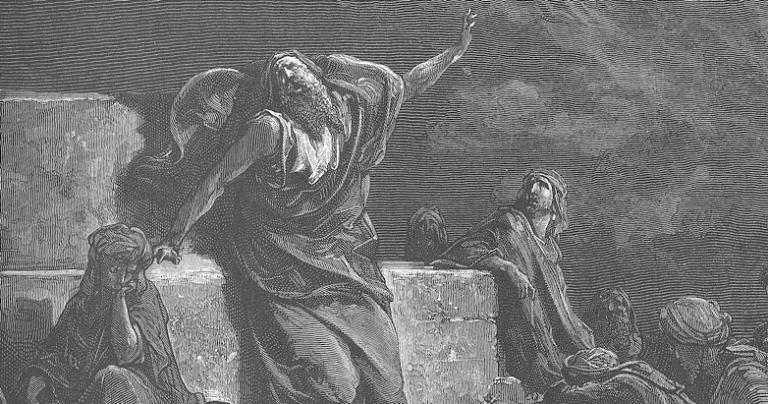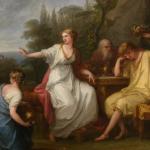 Sometimes the kids do need to get off the grass, but after a certain age you cannot ask them to do so without being “that guy.” Similarly, complaints about bad reasoning are never popular. If not done very gently, a person risks being annoying and making the masses angry. Using the term “masses” about the masses can trigger a bad reaction.
Sometimes the kids do need to get off the grass, but after a certain age you cannot ask them to do so without being “that guy.” Similarly, complaints about bad reasoning are never popular. If not done very gently, a person risks being annoying and making the masses angry. Using the term “masses” about the masses can trigger a bad reaction.
There is a double problem: cranks must be ignored and we are tempted to cry “crank” or “curmudgeon” when we get cranky about the message.
If Jesus is right that we will know people by their fruit, plenty of people seem called to be fruit inspectors who are rotten at the job or perhaps they irritate us so much they cannot do the job. Somebody has the job of giving a jeremiad, but aside from Jeremiah himself, it is hard to know if any particular “truth teller” is merely a jerk or is on to something. Telling us to get off the grass, when we want to walk on the grass, or pointing out our flaws is irritating while simultaneously attracts irritating people to do it who should not.
What if the truth-teller is also curmudgeonly?
One of the first philosophers, Heraclitus of Ephesus, is a cautionary tale for the rest of us. He had a message Ephesus needed to hear, but because he was also a difficult personality, they missed his message. Heraclitus spoke in catchy meme-able phrases (“the way up is the way down”), but he also felt called to inspect the fruit of his fellow Ephesians and his memorable message made men mad. He attacked the degenerate religion of the time:
241 They vainly purify themselves of blood-guilt by defiling themselves with blood, as though one who had stepped into mud were to wash with mud; he would seem to be mad, if any of men noticed him doing this. Further, they pray to these statues, as if one were to carry on a conversation with houses, not recognizing the true nature of gods or demi-gods.
As Saint Paul would discover attacking the religion of the Ephesians is not safe, but Heraclitus was right about Ephesus:
242 The secret rites practised among men are celebrated in an unholy manner.
The Homeric religion never found a good balance between popular religion, the outer sign of truth, and intellectual religion, the reality that the outer sign expressed. Popular religion that begins to focus on externals (such as idol worship in the case of pagans) as if the externals are the “thing” almost always become grafts and messes. The sacrifice was for something, but soon the sacrifice is the end. The stories in Hesiod or Homer had deeper meaning, but it is easy just to repeat the tales as religious entertainment.
Heraclitus was not secularizing, he was restoring the depth to the religion of Homer. Men went to oracles such as the great one at Delphi to find answers, but frequently the questions were merely mundane. The Oracle’s primary message was “know thyself,” a message primarily about seeing the smallness of people and our problems in the light of the great mountains that rise up around the Oracle, the gods, the wine-faced sea in the distance, and the weight of time. Yet too often the Oracle was treated as a “Magic 8 Ball” and what was (possibly) being said was lost. Heraclitus:
244 The lord whose oracle is in Delphi neither speaks out nor conceals, but gives a sign.
The messages from the Oracle were cryptic, perhaps in degenerate days to avoid being wrong and keep the customers coming. At her best, the Oracle was cryptic as a sign: the message of the Divine is always liberating us to begin a journey Godward. The sign points to a continued relationship with the world, people, and Divinity, not telling us what to do.
This is a message that cannot be marketed and so irritates those who would sell the sign! Saint Paul, hundreds of years later, would cut deeper and reveal greater truth, but by this time the images had become mere idols. The great poets Homer and Hesiod had been rendered useless at best and mostly harmful in the hands of the populace by the time of Plato. Four hundred years later at the time of Paul, they were artifacts with no living reality, intellectual chains.
Heraclitus of Ephesus had suggested that there was a reality, a divine Logos, behind Zeus. The great god was not God, but should have pointed to God:
228 One thing, the only truly wise, does not and does consent to be called by the name of Zeus.
This was not identical to the god of Homer, but is the Will hinted at through all his great epics. This Zeus is the master guide:
220 Thunderbolt steers all things.
Philosophical types would ponder Heraclitus’ cryptic messages, though they did not preserve his body of work. Popular religion ignored him or mocked the curmudgeon with the best revenge. They wrote is history after he was dead. Allegedly Heraclitus ended like many philosophers:
Finally he became a misanthrope, withdrew from the world, and lived in the mountains feeding on grasses and plants. However, having fallen in this way into a dropsy he came down to town and asked the doctors in a riddle if they could make a drought out of rainy weather. When they did not understand he buried himself in a cow-stall, expecting that the dropsy would be evaporated off by the heat of the manure; but even so he failed to effect anything, and ended his life at the age of sixty.
He died in his own . . .
Well, you get the idea. He may have been a crank, but he also pointed forward to the creative Word and the need to listen to the Logos:
194 Of the Logos which is as I describe it men always prove to be uncomprehending, both before they have heard it and when once they have heard it. For although all things happen according to this Logos men are like people of no experience, even when they experience such words and deeds as I explain, when I distinguish each thing according to its constitution and declare how it is; but the rest of men fail to notice what they do after they wake up just as they forget what they do when asleep.
Maybe we should wake up and listen to such cranks.
—————————-
Heraclitus quotations are from The Presocratic Philosophers (Kirk, Raven, Schofield) Cambridge University Press.












